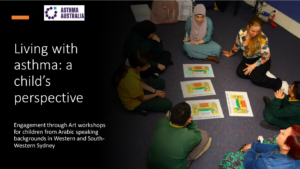Asthma Australia partnered with Social Equity Works to conduct consultations with parents of children with asthma from Arabic speaking backgrounds in Western Sydney. The purpose of the consultations was to identify the issues, opportunities, priorities, and potential partners to inform our longer-term strategy and guide the implementation of projects that better support young children with asthma. This project was funded by NSW Health.
While current projects at Asthma Australia focus on the impact of asthma for the broader community of children aged 5-9, this project focused on an Arabic speaking community to provide cultural insights to support our work moving forward.
Data indicated that between 2018-2019, 13% of children in Western Sydney were living with asthma and that there has been a steady increase in childhood asthma since 2016.1
What we did
As part of the project, we connected with five local organisations to speak with a total of 24 women from Arabic speaking backgrounds with at least one child living with asthma.
The consultations asked the parents to talk about their experience with having a child living with asthma and their understanding of their child’s/children’s experiences living with asthma. The sessions reflected on their needs and needs of their children, what was working well and what could be improved to help them to better manage their child’s asthma.
What we found
| One mother shared her son’s experience: ‘My son gets asthma when he plays soccer but he loves it so he uses his puffer at training so he can still play.’ |


Unsurprisingly, asthma had a big impact on all the families that we spoke to. Some common issues included:
- Common triggers for asthma
- Common treatments used to manage their asthma symptoms
- Impact of asthma on their child’s lifestyle
- Increased anxiety as a parent
- Understanding asthma medication
- Cost of asthma medication
- Using trusted sources of information
- Lack of coordinated care
| One mother shared her concern: ‘I get so worried at night when she is sick. I sit there and watch her breathing and I am scared, and I know she is scared too.’ |
Most parents also shared that the support they received from various health care professionals and school staff helped support their children in managing their asthma well.
A mother shared her son’s experience with asthma at school ‘My son knows to go to the office if he needs help. He has his puffer in his bag, but they keep one in the office too. They always ring and let me know if he has had to take it.’
However, there were several issues raised as needing further support including simple information about asthma management and medications, resources in Arabic, and greater coordination between health care providers.
Our Next Steps
Based on the experiences shared by this community Asthma Australia has committed to working on the following activities in the next year:
- Work directly with young children from Arabic speaking backgrounds living with asthma to learn more about their personal experiences
- Partner with community service providers to deliver culturally appropriate asthma education programs to parents from Arabic speaking communities
- Distribute Arabic language asthma resources previously developed by Asthma Australia to community organisations, general practices and pharmacies working with Arabic communities in Western Sydney
- Continue Asthma Australia’s work with schools to support asthma management in schools with families through the Schools Asthma Health Check tool and staff emergency asthma management training programs.
Thanks
We would like to thank all the women that shared their stories and the following organisations for their support: Ashcroft Public School, Western Sydney Community Centre inc., Arab Council of Australia, Cumberland Women’s Health Centre and Western Sydney Migrant Resource Centre and Syd West Multicultural Service. We would also like to thank Social Equity Works for their partnership during the project and NSW Health for funding the project.
References
- Health Stats. (2022). Asthma Prevalence in Children. Retrieved from Health Stats NSW: HealthStats NSW – Asthma prevalence in children






